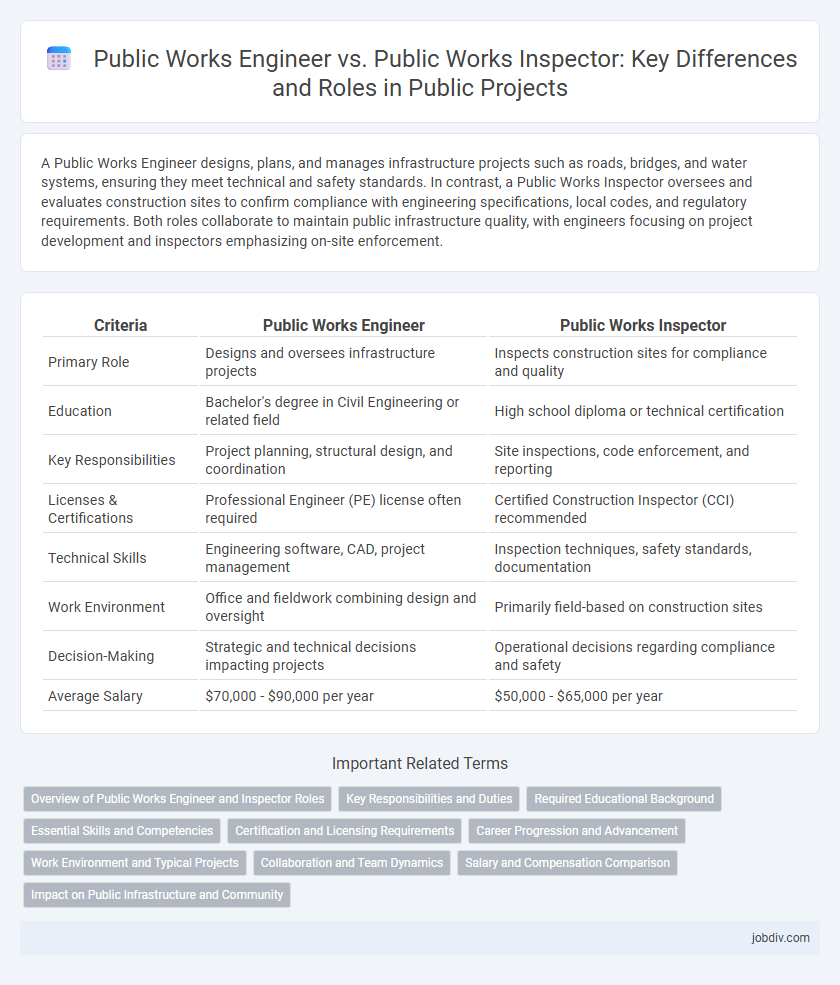A Public Works Engineer designs, plans, and manages infrastructure projects such as roads, bridges, and water systems, ensuring they meet technical and safety standards. In contrast, a Public Works Inspector oversees and evaluates construction sites to confirm compliance with engineering specifications, local codes, and regulatory requirements. Both roles collaborate to maintain public infrastructure quality, with engineers focusing on project development and inspectors emphasizing on-site enforcement.
Table of Comparison
| Criteria | Public Works Engineer | Public Works Inspector |
|---|---|---|
| Primary Role | Designs and oversees infrastructure projects | Inspects construction sites for compliance and quality |
| Education | Bachelor's degree in Civil Engineering or related field | High school diploma or technical certification |
| Key Responsibilities | Project planning, structural design, and coordination | Site inspections, code enforcement, and reporting |
| Licenses & Certifications | Professional Engineer (PE) license often required | Certified Construction Inspector (CCI) recommended |
| Technical Skills | Engineering software, CAD, project management | Inspection techniques, safety standards, documentation |
| Work Environment | Office and fieldwork combining design and oversight | Primarily field-based on construction sites |
| Decision-Making | Strategic and technical decisions impacting projects | Operational decisions regarding compliance and safety |
| Average Salary | $70,000 - $90,000 per year | $50,000 - $65,000 per year |
Overview of Public Works Engineer and Inspector Roles
Public Works Engineers design, plan, and manage infrastructure projects such as roads, bridges, and water systems to ensure public safety and compliance with regulations. Public Works Inspectors oversee construction activities on-site, verifying that work meets these design specifications and safety standards. Both roles collaborate closely to maintain and improve community infrastructure effectively.
Key Responsibilities and Duties
A Public Works Engineer designs, plans, and supervises infrastructure projects such as roads, bridges, and water systems, ensuring compliance with technical standards and safety regulations. A Public Works Inspector monitors construction sites, verifies quality control, enforces contract specifications, and reports deviations to maintain project integrity. Both roles collaborate to ensure public infrastructure is built efficiently, safely, and according to regulatory requirements.
Required Educational Background
A Public Works Engineer typically requires a bachelor's degree in civil engineering or a related field, often accompanied by professional engineering licensure. In contrast, a Public Works Inspector usually needs a high school diploma or associate degree, with specialized training or certification in construction inspection or public infrastructure standards. The engineer's education emphasizes design and project management, while the inspector's background focuses on field evaluations and compliance verification.
Essential Skills and Competencies
Public Works Engineers require strong technical expertise in civil engineering, project management, and design software proficiency to develop infrastructure plans effectively. Public Works Inspectors excel in detail-oriented skills, regulatory compliance knowledge, and on-site evaluation to ensure construction quality and safety standards are met. Both roles demand excellent communication, problem-solving abilities, and thorough understanding of local regulations to support public infrastructure projects successfully.
Certification and Licensing Requirements
Public Works Engineers typically require a Professional Engineer (PE) license obtained by passing the Fundamentals of Engineering (FE) exam followed by the Principles and Practice of Engineering (PE) exam, along with relevant work experience. Public Works Inspectors often need certifications such as the Certified Public Works Inspector (CPWI) or state-specific inspection licenses, emphasizing knowledge of construction standards and safety regulations. Both roles demand compliance with local, state, and federal licensing boards, ensuring regulatory adherence in public infrastructure projects.
Career Progression and Advancement
Public Works Engineers typically advance by gaining expertise in project design, management, and engineering principles, often moving into senior engineering roles or project management positions. Public Works Inspectors progress through accumulating experience in field inspections, compliance enforcement, and construction oversight, which can lead to supervisory roles or specialized inspection careers. Career advancement for engineers often emphasizes technical and managerial skills, while inspectors focus on regulatory knowledge and operational leadership.
Work Environment and Typical Projects
Public Works Engineers typically work in office settings and on-site, overseeing the design and implementation of infrastructure projects such as roads, bridges, and water systems. Their role involves technical planning, project management, and collaboration with contractors and government agencies. Public Works Inspectors primarily conduct field inspections to ensure construction compliance with safety, quality, and regulatory standards on projects like sewer installations, street repairs, and public building maintenance.
Collaboration and Team Dynamics
Public Works Engineers and Public Works Inspectors collaborate closely to ensure infrastructure projects meet design specifications and regulatory standards. Engineers develop technical plans and oversee project execution, while Inspectors provide on-site verification and quality control, fostering a dynamic team environment that enhances project accuracy and safety. Effective communication and shared problem-solving between these roles optimize project outcomes and public resource utilization.
Salary and Compensation Comparison
Public Works Engineers typically earn higher salaries than Public Works Inspectors due to their advanced technical expertise and responsibility for designing and overseeing infrastructure projects, with median annual salaries around $80,000 compared to $60,000 for inspectors. Compensation packages for engineers often include performance bonuses, comprehensive benefits, and opportunities for overtime, reflecting their critical role in project management and compliance. Public Works Inspectors receive competitive wages with emphasis on hourly pay and may receive additional incentives for fieldwork and safety inspections.
Impact on Public Infrastructure and Community
Public Works Engineers design, plan, and oversee the construction of infrastructure projects such as roads, bridges, and water systems, ensuring their safety, efficiency, and sustainability to meet community needs. Public Works Inspectors monitor and evaluate these projects on-site, verifying compliance with engineering specifications, safety codes, and environmental regulations to protect public welfare. Both roles are critical in maintaining infrastructure integrity and enhancing community quality of life through effective project execution and oversight.
Public Works Engineer vs Public Works Inspector Infographic

 jobdiv.com
jobdiv.com